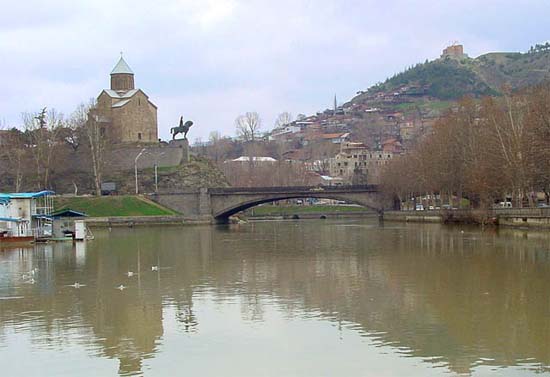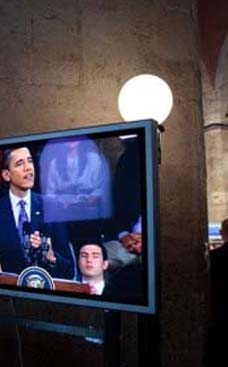
For its part, Georgia, the United States, and Georgia's neighborhood allies, should all take notice of what could be a politically-driven campaign by Europe to discredit a troublesome (if legitimate) Saakashvili government, and to secure the cooperation of the Kremlin. Either way, the article matters: as Russian troops re-amass along Georgia's borders, Russian Putin Youth activists attempt to enter Georgia, and a weirdly single-minded Opposition further tries to destabilize the capital, a revisionism of history and a fabricated portfolio of 'evidence' may be the cassus belli that the Kremlin seeks to conclude the jackbooted plunge they began last August.
Georgia RPCV Michael Cecire writes: The already embattled Georgian President Mikheil "Misha" Saakashvili's ill-fortunes don't seem to be improving
Doubting Der Spiegel–What is Order No. 2? Print E-mail
April 27, 2009
TCS DAILY
By Michael Cecire
The already embattled Georgian President Mikheil "Misha" Saakashvili's ill-fortunes don't seem to be improving. In late March, Der Spiegel published a damning account of the yet-unreleased findings of the EU inquiry into the brief August war between Georgia and Russia.
In short, the article places blame for the conflict most heavily upon the Georgian leadership, particularly Saakashvili. Paired with the PR blow of the New York Times' open questioning of the Georgian account in early November, there is a shifting consensus of the narrative. However, like the Times article, the circumstances of theSpiegel piece provide context for doubt and showcases more framed innuendo than evidence.
The EU-sponsored inquiry was officially announced in early December 2008 to investigate the causes of the August war in an objective manner. In a symbolic bid to highlight the commission's neutrality, Swiss veteran diplomat Heidi Tagliavini was appointed to lead the investigation. Although the final report has yet to be released, the Spiegel piece illustrates findings that explicitly lay majority blame with Georgia.
According to Spiegel, the inquiry's verdict is chiefly rooted in the existence of a rumored document known as Order Number 2. Issued on August 7, 2008 by Tbilisi, the order allegedly calls for the Georgian military to "reestablish constitutional order," which Spiegel reports as possible proof of premeditated aggression by Georgia. These same words were also uttered by Georgian General Mamuka Kurashvili on August 7th in televised remarks, and alluded to by the Russian deputy head of the general staff, Anatoly Nogovitsyn, in consultations with the EU investigation. To the commission and Spiegel, the exposure of this secret order will demonstrate that it was Georgia, and not Russia, who is guilty of aggression.
However, there is disagreement over the nature of this secret order; although the Spiegelarticle claims that the Georgian government has refused to permit access to this document, Temur Iakobashvili, Georgia's Minister for Reintegration, has vociferously denied the document's existence.
Thomas Goltz, a professor at the University of Montana and considered a foremost expert on the Caucasus, is skeptical of the conclusions being drawn based on Kurashvili's comments.
"[The 'constitutional order' quote] is a direct echo of Russian rationalization to go into Chechnya," says Goltz. "But it is also the basis of virtually any country's decision to re-establish control over breakaway pieces of real estate and mafia dens, ranging from the U.S. South in 1861 to Italian efforts to trim the mob in Sicily."
Goltz also has concerns about the article's information quality, including what he called the "burying" of Russia's distribution of passports to separatists halfway into the story, which served as the immediate cassus belli for Russian intervention. He also notes that the cell phone intercepts which point to Russian military movement well before originally acknowledged went unmentioned.
The leak itself might also be reason for pause. The commission, of which at least two members are of questionable neutrality, leaked the report exclusively to Der Spiegel, a curious choice given the notoriously strong relationship between Russia and Germany, whose government led the opposition within NATO to Georgia and Ukraine's accession bids. Although hardly damning evidence, the choice has raised eyebrows among those observers wary of the warm ties between Russia and Germany.
The official, final report has not yet been made public, and although the slant of the Spiegel piece unequivocally -- if unofficially -- places blame with Georgia, the context and content of the article was decidedly limited. It would be surprising if the final EU report were so narrowly focused. More to the point, although the article might legitimately raise concerns about the final report's fair-mindedness, there is no compelling reason to assume that the Spigel line is necessarily an echo of the EU commission, who have largely kept mum on the matter. In fact, it might be possible that Der Spiegel cherry-picked the Secret Order nugget from a report that may turn out to favor the Georgian position. Also, the relative silence from both Tbilisi (with the exception of Iakobashvili's denial of the order) and Moscow does not demonstrate the radical departure that the Spiegel article exhorts.
Paul Goble, renowned Eurasia specialist and publisher of the Window on Eurasia weblog, also points out that the commission's findings, however optically problematic if true, do not change the larger picture. In a recent post on his blog, Goble notes that the commission has done no more than find Saakashvili guilty of "miscalculation." On the other hand, Russia's invasion makes it "guilty of an international crime."
The alignment of these issues may be enough to legitimately question the motives of the European probe, whose Western European sponsors have been at the forefront of efforts to thaw relations with Russia. If the Spiegel piece accurately reflects a commission whose findings have truly been compromised by inclinations to placate Russia for political and economic reasons, then Europe's posturing as an honest broker between Russia and Georgia may no longer reflect reality.
This in mind, the fears of Georgia's western advocates are not ill-founded, as this interpretation suggests that Europe is using the commission as a vehicle to justify accelerating re-normalization efforts with Russia, from whom help on a host of issues -- from Afghanistan, to Iran, to stable energy -- is seen as crucial.
For its part, Georgia, the United States, and Georgia's neighborhood allies, should all take notice of what could be a politically-driven campaign by Europe to discredit a troublesome (if legitimate) Saakashvili government, and to secure the cooperation of the Kremlin. Either way, the article matters: as Russian troops re-amass along Georgia's borders, Russian Putin Youth activists attempt to enter Georgia, and a weirdly single-minded Opposition further tries to destabilize the capital, a revisionism of history and a fabricated portfolio of 'evidence' may be the cassus belli that the Kremlin seeks to conclude the jackbooted plunge they began last August.
Michael Cecire is a writer, traveler, and economic development practitioner from Virginia. A former Peace Corps Volunteer in Georgia, he currently works in urban redevelopment and researches international public policy. He is a regular contributor to the Democracy Project weblog and has his own weblog at http://michaelcecire.wordpress.com/.











